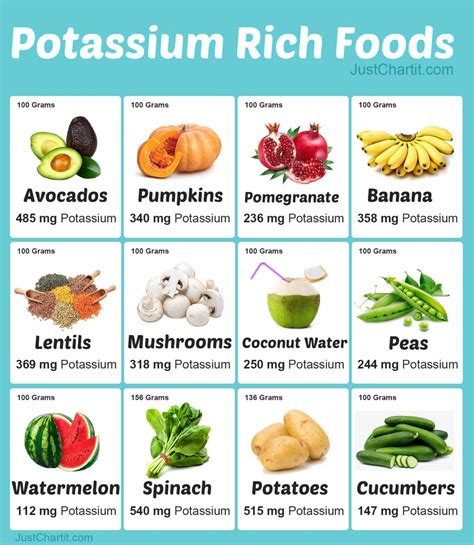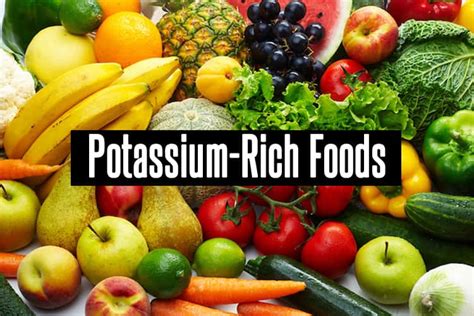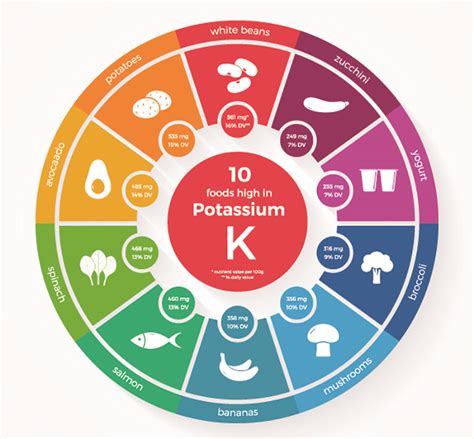Intro
Boost potassium intake with 7 rich foods, including bananas, spinach, and sweet potatoes, to support healthy blood pressure, muscle function, and bone health, while preventing deficiency and related diseases like hypokalemia.
Potassium is an essential mineral that plays a crucial role in maintaining various bodily functions, including heart health, blood pressure, and muscle function. Despite its importance, many people do not consume enough potassium-rich foods in their diet. The recommended daily intake of potassium is 4,700 milligrams for adults, but the average American consumes only about 2,600 milligrams per day. This deficiency can lead to a range of health problems, including fatigue, muscle weakness, and heart palpitations. In this article, we will explore the importance of potassium-rich foods and highlight seven key foods that can help you meet your daily potassium needs.
The importance of potassium cannot be overstated. It helps to regulate fluid balance in the body, which is essential for maintaining healthy blood pressure. Potassium also helps to counteract the effects of sodium, which can help to reduce blood pressure and the risk of heart disease. Furthermore, potassium is essential for healthy muscle function, including the muscles of the heart. A deficiency in potassium can lead to muscle weakness, fatigue, and heart palpitations.
In addition to its role in maintaining bodily functions, potassium is also important for overall health and wellbeing. Foods that are rich in potassium tend to be nutrient-dense, meaning they are rich in other essential vitamins and minerals. A diet that is rich in potassium-rich foods can help to support healthy weight management, reduce the risk of chronic diseases, and promote overall health and wellbeing. With so many benefits, it's clear that potassium-rich foods should be a staple of a healthy diet.
Introduction to Potassium-Rich Foods

Benefits of Potassium-Rich Foods

Key Sources of Potassium
Some of the richest sources of potassium include: * Fruits: bananas, avocados, apricots, and citrus fruits * Vegetables: leafy greens, sweet potatoes, and squash * Whole grains: brown rice, quinoa, and whole wheat bread * Lean proteins: salmon, chicken, and turkey7 Potassium-Rich Foods

Increasing Potassium Intake

Potassium Deficiency
A potassium deficiency can lead to a range of health problems, including: * Fatigue and muscle weakness * Heart palpitations and arrhythmias * High blood pressure and cardiovascular disease * Osteoporosis and bone fracturesConclusion and Final Thoughts

We invite you to share your thoughts and experiences with potassium-rich foods in the comments below. Have you noticed any benefits from incorporating more potassium-rich foods into your diet? Do you have any favorite potassium-rich foods or recipes? Share your stories and help others learn about the importance of potassium-rich foods.
What is the recommended daily intake of potassium?
+The recommended daily intake of potassium is 4,700 milligrams for adults.
What are the symptoms of a potassium deficiency?
+The symptoms of a potassium deficiency include fatigue, muscle weakness, heart palpitations, and high blood pressure.
How can I increase my potassium intake?
+You can increase your potassium intake by eating a variety of fruits and vegetables, whole grains, and lean proteins, such as bananas, spinach, sweet potatoes, and salmon.
Are there any risks associated with taking potassium supplements?
+Yes, taking potassium supplements can be risky if you have kidney disease or are taking certain medications, such as ACE inhibitors or diuretics. It's always best to talk to your doctor before taking any supplements.
Can I get enough potassium from food sources alone?
+Yes, it's possible to get enough potassium from food sources alone. Eating a variety of whole foods, including fruits, vegetables, whole grains, and lean proteins, can provide adequate potassium for most people.
